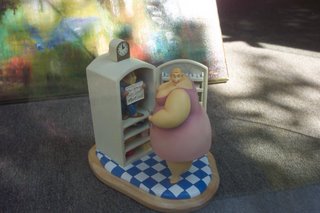On a Season 3 episode of Sex and the City, Charlotte York (Kristin Davis) conquers the health-club steam room, quelling her weight-and-shape fears, by finally baring it all. Charlotte struggles throughout the episode with body image concerns, compares herself to others, and resolves her body conflict only after another woman in the steam room compliments her on her breasts.
I remember being somewhat surprised by Charlotte’s struggle, as she was typically referred to (in my very unscientific poll) as the foursome’s most attractive. If Charlotte was unhappy with her appearance, what does that say for the rest of us?
Recently, Kristin Davis revealed to the Scottish Daily Record that, like Charlotte, she too struggled with eating and body image concerns. "Everyone would talk about their diets and working out, and what it made me do was go to Craft services—where all the food for the cast and crew was—and I would eat." As compensation, Ms. Davis began to run seven miles at a pop, and, in regard to her over-exercising, she notes, “I was killing myself. My ankles hurt, my knees hurt and I was working 18-hour days."
Just being surrounded by Hollywood’s ultra-thin glitz wasn’t bad enough—when Ms. Davis joined the show’s cast, a reporter noted she’d be too heavy to take the lead role, based on the life of Candace Bushnell. This is the same Ms. Bushnell, who in a 2002 New York magazine interview, referred to a dress in a store window and proclaimed, “See, this is the kind of thing that if you have any fat at all, it'll show right up!" When her interviewer pointed out that Ms. Bushnell was someone who in fact, had no fat at all, she retorted, "If you could just see me without my clothes on!"
While the role went to Sarah Jessica Parker, damages were awarded to Davis, who revealed that following this reporter’s comment, "I tried not to cry, and said I had to leave,” after which, she binged on cookies to the tune of, "To hell with you, I'm going to eat what I want.'"
No matter what other descriptors we might use to depict Charlotte (romantic, kind, optimistic, loving), the one that sticks is the one that she, and the actress who gave her life, dreads most: not skinny enough. It’s now clear that Ms. Davis, like any of us who might be cast in a similar role, managed to infuse her character’s struggle with an emotionality that can only be gained through experience.




